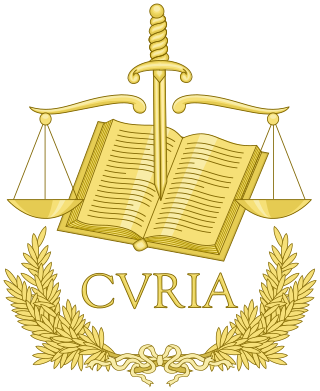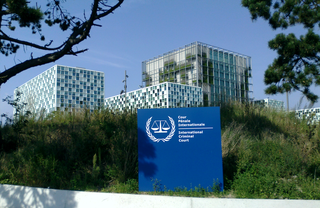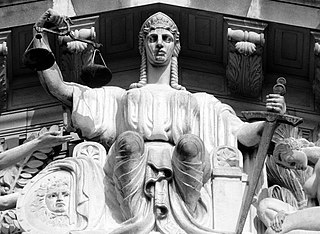| Court of Justice of the Andean Community | |
|---|---|
| Tribunal de Justicia de la Comunidad Andina (Spanish) | |
| Established | 1984 |
| Location | Quito, Ecuador |
| Judge term length | 6 years |
| Number of positions | 4 |
| Website | www.tribunalandino.org.ec |
| President | |
| Currently | Hernán Rodrigo Romero Zambrano |
The Court of Justice of the Andean Community was founded in 1979 by the Cartagena Agreement and began operating in January 1984 in Quito, Ecuador; it was originally known as the Andean Pact. [1]
The Andean Community is a sub-regional economic and social integration bloc comprising four member states: Bolivia, Colombia, Ecuador, and Peru, along with Chile and the Mercosur states as associate members. [2] The Mercosur States are Argentina, Brazil, Paraguay, and Uruguay. [1]
Since 1969, the area underwent numerous changes, including the formation of a free trade area. [1] In 1996, the members decided to reform the Cartagena Agreement and introduced the Protocol of Trujillo, which created several changes. [1] The Andean Community was created and replaced the Andean Pact. [1] The Andean Integration System (AIS) was also created. [1] "The main bodies of the AIS currently include: the Andean Council of Presidents; Andean Council of Foreign Affairs Ministers; Andean Community Commission; Andean Community Secretariat-General; Andean Parliament; Andean Development Corporation; Latin American Reserve Fund; and the Andean Community Tribunal of Justice. [3]
The ATJ is a single instance court, composed of one judge from each member state, which has exclusive jurisdiction over the Andean Community treaties and decisions of the Council of Foreign Ministers, Commission as well as Resolutions of the Secretariat General. [4] The ATJ is able to hear cases involving "failure to fulfill obligations, annulment, failure to act, preliminary rulings, voluntary arbitration, and has an administrative jurisdiction over employees of the community's institutions". [5] All of the decisions of the court are final and binding once the decision is published in the Official Gazette of the Cartagena Agreement. [5]
"There are two forms of preliminary rulings: optional references from lower courts and mandatory references from courts of last instance." [5] Preliminary references do not suspend national proceedings; "this suspensory effect only applies if the reference to the ATJ is from a court of last instance." [5] Pursuant to an optional reference ("consulta facultativa"), if the ATJ does not render its preliminary ruling before the national court's decision is due, the national court may rule without waiting for the ATJ to issue its ruling. [5] This set-up certainly ensures that the ATJ's docket is not overwhelmed by preliminary references from perhaps more "curious" lower courts. [5] However, despite avoiding unduly long proceedings, it may perhaps be self-defeating, as it delays the ATJ from addressing difficult issues. [5]
Until 31 December 2013, the Court has 2,444 known preliminary interpretations requested by national judges, 119 infringement actions against Member Countries, 54 actions for nullity, 17 business processes and 6 for failure to inactivity Community bodies, ranking as the third most active international court in the world after the European Court of Human Rights and the European Court of Justice. [6]
Judges are selected thorough a process involving the four member states where "each member state presents a list of three candidates and the judges are selected from those lists by unanimous decision of the member states". [5] Qualified "candidates must possess a good moral reputation and be competent to exercise the highest judicial roles in their respective countries or be highly competent jurists". [5] The judges are appointed for a six-year term, which is renewable once. [4] The function of the Court's president rotates annually and a provision is made for the creation of an advocate-general. [5]
"Any activity related to the actions of nullity and infringement, the action for failure or downtime and labor-related claims will start by application signed by the party and his lawyer, addressed to the President of the Court and filed with the Secretary original and three copies. Also, the demand may be sent via facsimile, mail or electronically with due support confirmation of receipt by the Tribunal." [6]
"In this case, the claimant shall within three days to submit by the original mailing application and its attachments. Otherwise, the application shall be deemed not filed. In the event that the application does not appear personally before the court, and when the applicant is a natural or legal person, the signatures of the party or its legal representative and attorney, shall be duly acknowledged before a notary or judge the member country concerned." [6]

The International Court of Justice, sometimes known as the World Court, is one of the six principal organs of the United Nations (UN). It settles disputes between states in accordance with international law and gives advisory opinions on international legal issues. The ICJ is the only international court that adjudicates general disputes between countries, with its rulings and opinions serving as primary sources of international law.

The European Court of Justice, formally just the Court of Justice, is the supreme court of the European Union in matters of European Union law. As a part of the Court of Justice of the European Union, it is tasked with interpreting EU law and ensuring its uniform application across all EU member states under Article 263 of the Treaty of the Functioning of the European Union (TFEU).

The General Court, informally known as the European General Court (EGC), is a constituent court of the Court of Justice of the European Union. It hears actions taken against the institutions of the European Union by individuals and member states, although certain matters are reserved for the European Court of Justice. Decisions of the General Court can be appealed to the Court of Justice, but only on a point of law. Prior to the coming into force of the Lisbon Treaty on 1 December 2009, it was known as the Court of First Instance.
An ecclesiastical court, also called court Christian or court spiritual, is any of certain courts having jurisdiction mainly in spiritual or religious matters. In the Middle Ages, these courts had much wider powers in many areas of Europe than before the development of nation states. They were experts in interpreting canon law, a basis of which was the Corpus Juris Civilis of Justinian, which is considered the source of the civil law legal tradition.

The Andean Community is a free trade area with the objective of creating a customs union comprising the South American countries of Bolivia, Colombia, Ecuador, and Peru. The trade bloc was called the Andean Pact until 1996 and came into existence when the Cartagena Agreement was signed in 1969. Its headquarters are in Lima, Peru.

International courts are formed by treaties between nations or under the authority of an international organization such as the United Nations and include ad hoc tribunals and permanent institutions but exclude any courts arising purely under national authority.

The Court of Cassation of Belgium is the supreme court of the Belgian judiciary. The court is composed of thirty judges with life tenure who are nominated by the High Council of Justice of Belgium and appointed by the Belgian federal government. The court handles cases in the two main languages of Belgium, Dutch and French, and provides certain facilities for cases in German. The court is assisted in its work by a public prosecutor's office and a bar association, which both function separately from other structures. The duty of the public prosecutor's office is to provide advisory opinions to the court on how the law ought to be interpreted and applied. The attorneys of the court's bar association assist litigants in proceedings before the court; in certain cases, their assistance is mandatory.
In the Catholic Church, a declaration of nullity, commonly called an annulment and less commonly a decree of nullity, and by its detractors, a "Catholic divorce", is an ecclesiastical tribunal determination and judgment that a marriage was invalidly contracted or, less frequently, a judgment that ordination was invalidly conferred.
Flaminio Costa v ENEL (1964) Case 6/64 was a landmark decision of the European Court of Justice which established the primacy of European Union law over the laws of its member states.

The judiciary of Colombia is a branch of the State of Colombia that interprets and applies the laws of Colombia, to ensure equal justice under law, and to provide a mechanism for dispute resolution. The judiciary comprises a hierarchical system of courts presided over by judges, magistrates and other adjudicators.
Article 6 of the European Convention on Human Rights is a provision of the European Convention which protects the right to a fair trial. In criminal law cases and cases to determine civil rights it protects the right to a public hearing before an independent and impartial tribunal within reasonable time, the presumption of innocence, right to silence and other minimum rights for those charged in a criminal case.
A preliminary ruling is a decision of the European Court of Justice (ECJ) on the interpretation of European Union law that is given in response to a request from a court or a tribunal of a member state. A preliminary ruling is a final determination of European Union law, with no scope for appeal. The ECJ hands down its decision to the referring court, which is then obliged to implement the ruling.

The Court of Justice of the European Union (CJEU) is the judicial branch of the European Union (EU). Seated in the Kirchberg quarter of Luxembourg City, Luxembourg, this EU institution consists of two separate courts: the Court of Justice and the General Court. From 2005 to 2016 it also contained the Civil Service Tribunal. It has a sui generis court system, meaning ’of its own kind’, and is a supranational institution.

The Southern Common Market, commonly known by Spanish abbreviation Mercosur, and Portuguese Mercosul, is a South American trade bloc established by the Treaty of Asunción in 1991 and Protocol of Ouro Preto in 1994. Its full members are Argentina, Brazil, Paraguay, and Uruguay. Venezuela is a full member but has been suspended since 1 December 2016. Associate countries are Bolivia, Chile, Colombia, Ecuador, Guyana, Peru, and Suriname.
The Benelux Court of Justice is a court which is common to the Benelux countries Belgium, Netherlands and Luxembourg. The organisation was established by the treaty of 31 March 1965. The court's budget rests with the Benelux Union and is of 9 judges of the supreme courts as well as 6 judges of the courts of appeal of the three countries. The court is mainly tasked with answering requests for preliminary rulings from the supreme courts regarding regulations which are common to the three countries and serves as a civil service tribunal for personnel of the Benelux Economic Union and the Benelux Organization for Intellectual Property (BOIP), although it may also be tasked with advising the three governments, and with direct judicial tasks following the entry into force in 2016 of a 2012 protocol to the treaty.

Exclusion of judicial review has been attempted by the Parliament of Singapore to protect the exercise of executive power. Typically, this has been done though the insertion of finality or total ouster clauses into Acts of Parliament, or by wording powers conferred by Acts on decision-makers subjectively. Finality clauses are generally viewed restrictively by courts in the United Kingdom. The courts there have taken the view that such clauses are, subject to some exceptions, not effective in denying or restricting the extent to which the courts are able to exercise judicial review. In contrast, Singapore cases suggest that ouster clauses cannot prevent the High Court from exercising supervisory jurisdiction over the exercise of executive power where authorities have committed jurisdictional errors of law, but are effective against non-jurisdictional errors of law.

An ouster clause or privative clause is, in countries with common law legal systems, a clause or provision included in a piece of legislation by a legislative body to exclude judicial review of acts and decisions of the executive by stripping the courts of their supervisory judicial function. According to the doctrine of the separation of powers, one of the important functions of the judiciary is to keep the executive in check by ensuring that its acts comply with the law, including, where applicable, the constitution. Ouster clauses prevent courts from carrying out this function, but may be justified on the ground that they preserve the powers of the executive and promote the finality of its acts and decisions.
Karen J. Alter is an American academic, well known for her interdisciplinary work on international law's influence in international and domestic politics. Alter is a figure in comparative international courts and the politics of international regime complexity. Her early work focused on the European Court of Justice, a topic on which she published two books and many articles. Karen Alter is a Guggenheim Fellow, and the winner of a Berlin Prize from the American Academy in Berlin. Alter has a courtesy appointment at Northwestern Law School. Fluent in French, Italian and German, Alter has conducted research throughout Europe, Africa and Latin America.
Cesare P.R. Romano, is an Italian and American international law scholar, known as an authority on international law, international courts, and international human rights. He is a Professor of Law at Loyola Law School Los Angeles.
Srl CILFIT v Ministry of Health (1982) Case 283/81 is an EU law case, concerning preliminary references to the Court of Justice of the European Union.